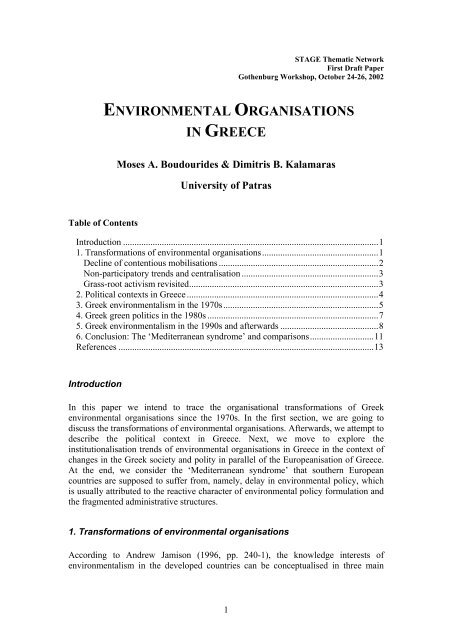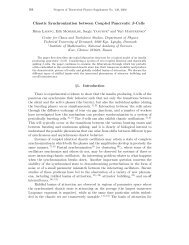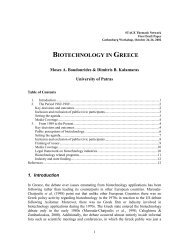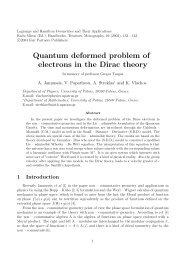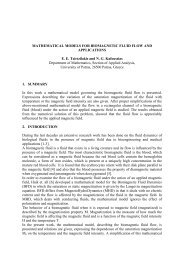Environmental Organisations in Greece
Environmental Organisations in Greece
Environmental Organisations in Greece
Create successful ePaper yourself
Turn your PDF publications into a flip-book with our unique Google optimized e-Paper software.
STAGE Thematic Network<br />
First Draft Paper<br />
Gothenburg Workshop, October 24-26, 2002<br />
ENVIRONMENTAL ORGANISATIONS<br />
IN GREECE<br />
Moses A. Boudourides & Dimitris B. Kalamaras<br />
University of Patras<br />
Table of Contents<br />
Introduction ................................................................................................................1<br />
1. Transformations of environmental organisations...................................................1<br />
Decl<strong>in</strong>e of contentious mobilisations ......................................................................2<br />
Non-participatory trends and centralisation ............................................................3<br />
Grass-root activism revisited...................................................................................3<br />
2. Political contexts <strong>in</strong> <strong>Greece</strong> ....................................................................................4<br />
3. Greek environmentalism <strong>in</strong> the 1970s....................................................................5<br />
4. Greek green politics <strong>in</strong> the 1980s ...........................................................................7<br />
5. Greek environmentalism <strong>in</strong> the 1990s and afterwards ...........................................8<br />
6. Conclusion: The ‘Mediterranean syndrome’ and comparisons............................11<br />
References ................................................................................................................13<br />
Introduction<br />
In this paper we <strong>in</strong>tend to trace the organisational transformations of Greek<br />
environmental organisations s<strong>in</strong>ce the 1970s. In the first section, we are go<strong>in</strong>g to<br />
discuss the transformations of environmental organisations. Afterwards, we attempt to<br />
describe the political context <strong>in</strong> <strong>Greece</strong>. Next, we move to explore the<br />
<strong>in</strong>stitutionalisation trends of environmental organisations <strong>in</strong> <strong>Greece</strong> <strong>in</strong> the context of<br />
changes <strong>in</strong> the Greek society and polity <strong>in</strong> parallel of the Europeanisation of <strong>Greece</strong>.<br />
At the end, we consider the ‘Mediterranean syndrome’ that southern European<br />
countries are supposed to suffer from, namely, delay <strong>in</strong> environmental policy, which<br />
is usually attributed to the reactive character of environmental policy formulation and<br />
the fragmented adm<strong>in</strong>istrative structures.<br />
1. Transformations of environmental organisations<br />
Accord<strong>in</strong>g to Andrew Jamison (1996, pp. 240-1), the knowledge <strong>in</strong>terests of<br />
environmentalism <strong>in</strong> the developed countries can be conceptualised <strong>in</strong> three ma<strong>in</strong><br />
1
ways: “as a social cosmology, a set of technological criteria, and a way of organiz<strong>in</strong>g<br />
the production and dissem<strong>in</strong>ation of environmental knowledge” (p. 240), three ways<br />
which have been radically transformed from the 1970s to the 1990s, transform<strong>in</strong>g<br />
environmentalism “from a critical social movement <strong>in</strong>to an <strong>in</strong>fluential science and<br />
technology network of actors”. In fact:<br />
• Concern<strong>in</strong>g the cosmological dimension, environmentalists <strong>in</strong> the 1970s was<br />
proclaim<strong>in</strong>g systemic holism (‘ecologism’), i.e., a new world-view, <strong>in</strong> which<br />
nature was conceived as a whole, earth as one, and natural processes <strong>in</strong> one place<br />
as affect<strong>in</strong>g the environment thousand miles away. In the 1990s, as Jamison<br />
argues, globalism and the programme of ‘susta<strong>in</strong>able development’ are succeed<strong>in</strong>g<br />
the previous holistic world-views.<br />
• On the technological dimension, environmental movements <strong>in</strong> the 1970s were<br />
criticis<strong>in</strong>g certa<strong>in</strong> technologies, for example, nuclear power, petrochemicals, etc.,<br />
while they were propos<strong>in</strong>g alternative criteria for technological development, such<br />
as resource conservation, recycl<strong>in</strong>g of wastes, use of renewable energy, small<br />
scale, etc. Subsequently, <strong>in</strong> the 1990s, environmental organisation became<br />
proponents of technological <strong>in</strong>novations of ‘clean production’.<br />
• In terms of organis<strong>in</strong>g and dissem<strong>in</strong>at<strong>in</strong>g environmental knowledge,<br />
environmental movements <strong>in</strong> the 1970s were aga<strong>in</strong>st the rule of expert elites,<br />
while they were favour<strong>in</strong>g traditional approaches to science and technology and<br />
encourag<strong>in</strong>g participatory grass roots <strong>in</strong>itiatives. Moreover, they were develop<strong>in</strong>g<br />
an <strong>in</strong>terdiscipl<strong>in</strong>ary approach to knowledge, try<strong>in</strong>g to comb<strong>in</strong>e natural and social<br />
science <strong>in</strong>to <strong>in</strong>novative k<strong>in</strong>ds of ‘human ecology’. On the contrary, <strong>in</strong> the course<br />
of the 1990s, environmentalism was transformed <strong>in</strong>to professional,<br />
<strong>in</strong>stitutionalised and expert-dom<strong>in</strong>ated organisational forms.<br />
Decl<strong>in</strong>e of contentious mobilisations<br />
There are many examples of European environmental organisations (like Italia Nostra<br />
<strong>in</strong> Italy, the Royal Society for the Protection of Birds <strong>in</strong> the UK, to mention only a<br />
few), which have chosen non-confrontational styles of action, rely<strong>in</strong>g more on their<br />
members’ subscriptions than their militant engagement. Similarly, many<br />
environmentalists orig<strong>in</strong>ally with a radical and participatory profile <strong>in</strong> the 1970s and<br />
the early 1980s seem to have gradually shifted their orientation from protest to<br />
pressure, as many commentators of the transformations of environmentalism attest.<br />
For <strong>in</strong>stance, some of the observed changes by Diani and Donati (1999, pp. 17-20)<br />
are:<br />
• Political ecology organisations have abandoned contentious mobilisations <strong>in</strong><br />
favour of referenda, petition<strong>in</strong>g campaigns, ‘green sharehold<strong>in</strong>g’, voluntary action<br />
<strong>in</strong> defence of the environment, lobby<strong>in</strong>g, educational campaigns and production of<br />
educational and commercial products like books and videotapes.<br />
• They have even granted their logos to commercial products as a form of ‘ecolabel’<br />
<strong>in</strong> exchange of money or support.<br />
• In parallel, they have been accepted, at least to some extent, to <strong>in</strong>stitutional policy<br />
bodies and procedures or they have provided these bodies with their expert advice.<br />
Of course, such traits and trends require legitimisation and respectability, which<br />
2
are not compatible with strong disruptive tactics, which was followed orig<strong>in</strong>ally<br />
by the contentious movements.<br />
Non-participatory trends and centralisation<br />
In parallel to the decl<strong>in</strong>e of contentious mobilisations, environmental movement<br />
organisations (EMOs) seem to move from participatory to professionalised modes of<br />
operation, as some comparative studies suggest. Professional activists <strong>in</strong>creas<strong>in</strong>gly<br />
control campaign plann<strong>in</strong>g and co-ord<strong>in</strong>ation (Diani & Donati, 1999, pp. 20). Many<br />
employees of ecology groups’ headquarters are tra<strong>in</strong>ed <strong>in</strong> public relations,<br />
communication and journalism while others have higher education <strong>in</strong> science or law<br />
(ibid.). Furthermore, the criteria for recruitment of these people are <strong>in</strong>creas<strong>in</strong>gly<br />
professional rather than just their previous experience <strong>in</strong> environmental issues or other<br />
forms of political activism (ibid.). Members or supporters of environmental groups<br />
are <strong>in</strong> most cases <strong>in</strong>volved <strong>in</strong> their organisations’ actions without direct mobilisation<br />
but only through communication <strong>in</strong> mail<strong>in</strong>g lists and appeals for subscription renewal<br />
(ibid.).<br />
The trend towards professionalism is accompanied by the <strong>in</strong>crease <strong>in</strong> the division of<br />
labour and the functional differentiation with<strong>in</strong> EMOs, which <strong>in</strong> turn has <strong>in</strong>creased the<br />
control of headquarters over campaigns and actions, even when the issues at hand are<br />
clearly local <strong>in</strong> nature (Diani & Donati, 1999, p. 19). The mission of local branches of<br />
EMOs is <strong>in</strong> many cases fund-rais<strong>in</strong>g. But organisational survival and autonomy of<br />
EMOs <strong>in</strong>creas<strong>in</strong>gly depend on sources other than memberships or public and<br />
corporate fund<strong>in</strong>g (ibid.).<br />
The <strong>in</strong>creas<strong>in</strong>g professional structures of EMOs force them to compete with each<br />
other <strong>in</strong> order to attract f<strong>in</strong>ancial resources from the same pool of potential supporters<br />
(Diani & Donati, 1999, p. 20). This develop<strong>in</strong>g competition discourages <strong>in</strong>tegration<br />
and collaboration with<strong>in</strong> the movement (ibid.). As Diani and Donati argue <strong>in</strong> relation<br />
to the German case, the outcome may be that the mobilisation capacity of the<br />
movement decreases as a whole (ibid.).<br />
Grass-root activism revisited<br />
Although the aforementioned traits and trends of EMOs suggest that these<br />
organisations are mov<strong>in</strong>g from a participatory contentious model towards<br />
<strong>in</strong>stitutionalisation along with a gradually prevail<strong>in</strong>g model of public <strong>in</strong>terest lobby,<br />
there is some evidence for scepticism on these trends (Diani & Donati, 1999, p. 21).<br />
Indeed, there is evidence of grass-roots participation <strong>in</strong> the form of voluntary work<br />
rather than disruptive voluntary action (Diani & Donati, 1999, p. 18). Moreover, new<br />
participatory protest organizations or networks of groups were spawned <strong>in</strong> the 1990s<br />
(Diani & Donati, 1999, p. 21). For example, confrontational grass-root mobilisations<br />
occurred repeatedly <strong>in</strong> the United K<strong>in</strong>gdom <strong>in</strong> the 1990s promoted by, amongst<br />
others, Earth First!, the <strong>Environmental</strong> Liberation Front and anti-road coalitions<br />
(ibid.). In other European countries, like Ireland, Italy and Germany, local conflicts<br />
and protests were also significant. Furthermore, Diani and Donati report national<br />
networks of groups, like Women’s <strong>Environmental</strong> Network <strong>in</strong> Brita<strong>in</strong> and Ireland,<br />
3
that favour voluntary, grass-roots participation rather than professional activism<br />
(ibid.).<br />
By this revival of grass-roots groups and participatory protest organisations, one<br />
witnesses the unease created by the grow<strong>in</strong>g <strong>in</strong>stitutionalisation of major<br />
environmental actors <strong>in</strong> the periphery of the environmental movement (Diani &<br />
Donati, 1999, p. 22). Furthermore, major national EMOs have not played any<br />
substantive role <strong>in</strong> promot<strong>in</strong>g local mobilizations but rather they have represented<br />
their local coalitions <strong>in</strong> media and <strong>in</strong>stitutions: they have acted as ‘<strong>in</strong>stitutional allies’<br />
giv<strong>in</strong>g local conflicts a greater visibility (ibid.).<br />
2. Political contexts <strong>in</strong> <strong>Greece</strong><br />
Opportunities for the emergence of social movements depend on multiple contexts,<br />
such as <strong>in</strong>stitutional, cultural and political, over which differences among social<br />
movements <strong>in</strong> different countries can be analysed. Here, we will refer to the political<br />
contexts <strong>in</strong> <strong>Greece</strong>, which have shaped Greek environmentalism. In particular, we will<br />
discuss the effect of such factors as political tradition, political culture and the role of<br />
the state <strong>in</strong> <strong>Greece</strong>.<br />
Undoubtedly, compar<strong>in</strong>g Greek environmentalism with correspond<strong>in</strong>g western<br />
European cases, what one witnesses <strong>in</strong> <strong>Greece</strong> is a quasi-movement rather than a wellestablished<br />
and deep-rooted green movement (Demertzis, 1995, p. 194). Mass<br />
<strong>in</strong>volvement as well as durable support and attractiveness are the fundamental (s<strong>in</strong>e<br />
qua non) but miss<strong>in</strong>g elements for the development of an environmental social<br />
movement <strong>in</strong> <strong>Greece</strong>, which may be related to the lack of environmental<br />
consciousness <strong>in</strong> <strong>Greece</strong> (Demertzis, 1995, p. 196).<br />
A number of factors can be mentioned as reasons for the lack of Greek<br />
environmentalism. First, the feeble economic situation of <strong>Greece</strong> did not leave much<br />
room for environmental protection to culm<strong>in</strong>ate <strong>in</strong> public debates dur<strong>in</strong>g the post-war<br />
era. The rapid economic development, which lasted until the early 1970s, had<br />
modernised aggressively the Greek society. This modernisation was largely based on<br />
small manufactur<strong>in</strong>g, middle range <strong>in</strong>dustry, tourism, construction and massive<br />
remittances of Greek immigrants (Demertzis, 1995, p. 196). In parallel, Greek<br />
economy suffered, and to a certa<strong>in</strong> degree still suffers, from a parasitic or ‘grey’<br />
economic activity. These factors have led to an unprecedented vertical and horizontal<br />
social mobility that has shattered traditional lifestyles and identities and have resulted<br />
a rapid and unplanned urbanisation (Demertzis, 1995, p. 197).<br />
Second, Greek modernisation has contributed to the emergence of middle social<br />
layers with atomistic and state-oriented behaviour, which is related to the traditional<br />
Greek ‘statism’ (Mouzelis, 1986; Sotiropoulos, 1995). Diachronically, a common<br />
feature of the Greek polity is its over-concentrated adm<strong>in</strong>istrative structure. This is<br />
due to both historical and political reasons. On the one hand, there are legacies of the<br />
Byzant<strong>in</strong>e and Ottoman empires and the belated development of the Greek<br />
bourgeoisie (Demertzis, 1995, p. 197). On the other hand, the hierarchical (top-down)<br />
model of governance as well as the recurr<strong>in</strong>g <strong>in</strong>fluence of ‘clientelism’ both followed<br />
4
and reflected the weakness of the Greek civil society. In fact, the clientelist <strong>in</strong>fluence<br />
is usually presented as the reason of the non-participatory character of the Greek<br />
political culture (Alexandropoulos & Serdedakis, 2000, p. 10).<br />
The relationship between environment and the state represents a highly debated topic<br />
due to the fact that there exist various national environmental policy implementations<br />
as well as national responses to transnational policy-mak<strong>in</strong>g formed from such<br />
supranational <strong>in</strong>stitutions as the EU (Kousis, 1994). In particular, the Greek state is<br />
usually described as actively <strong>in</strong>terven<strong>in</strong>g <strong>in</strong> social relations play<strong>in</strong>g the role of a<br />
powerful distributor of <strong>in</strong>comes, resources and advantages of all k<strong>in</strong>ds (Demertzis,<br />
1995, p. 197). Conservative or populist political elites, manifested through the two<br />
dom<strong>in</strong>ant parties <strong>in</strong> <strong>Greece</strong> <strong>in</strong> the last 25 years, have been us<strong>in</strong>g the state apparatus as<br />
a tool for an easy absorption of unemployment as well as a means to secure potential<br />
clientele. This recurr<strong>in</strong>g practice led governmental parties to adopt non-productive<br />
f<strong>in</strong>ancial, protective and distributive policies (ibid.). In turn, these policies have<br />
reproduced the societal dependence on the state.<br />
Another important component of Greek political culture is ‘partyness’. Greek scholars<br />
have noted the hegemony of parties as political <strong>in</strong>stitutions especially after the fall of<br />
military junta and the restoration of democracy <strong>in</strong> 1974 (Alexandropoulos &<br />
Serdedakis, 2000, p. 12). Partyness can be regarded as determ<strong>in</strong>ant of political<br />
opportunities for the rise of social movements, like the environmental, namely that<br />
social problems can become political issues <strong>in</strong> <strong>Greece</strong> only when they are<br />
<strong>in</strong>termediated by political parties (Alexandropoulos & Serdedakis, 2000, p. 12).<br />
3. Greek environmentalism <strong>in</strong> the 1970s<br />
Greek environmentalism has essentially started dur<strong>in</strong>g the mid 1970s (Demertzis,<br />
1995, p. 194). In this <strong>in</strong>fantile period, at least eight environmental mobilisations were<br />
recorded. Among them are the cases of Megara (1973), Volos (1975), Pylos (1975)<br />
and Karystos (1977-1979) (Demertzis, 1995, p. 194). They were all grass-roots<br />
mobilisations aim<strong>in</strong>g to prevent new <strong>in</strong>dustrial <strong>in</strong>stallations (ibid.). These<br />
mobilisations <strong>in</strong>cluded demonstrations, strikes, public debates and propagation of<br />
demands and ideas through local media. They signalled the first time for<br />
environmental problems to appear as social problems. Despite the rapid post-war<br />
<strong>in</strong>dustrial development, disorganised urbanisation etc. that had already caused serious<br />
environmental damages, it was only at that particular time and <strong>in</strong> those particular<br />
places that environmental problems became social problems concern<strong>in</strong>g local citizens<br />
(Alexandropoulos & Serdedakis, 2000, p. 13). Curiously, other <strong>in</strong>dustrialised and<br />
environmentally degenerated cities like Elefsis, Megalopoli, Ptolemaes as well as<br />
areas near Athens and Thessaloniki had never experienced environmental<br />
mobilisations (ibid.).<br />
A first common feature of all the eight cases dur<strong>in</strong>g this period was that the<br />
motivation of protests was not deep ecology but rather ‘simple environmentalism’<br />
(Demertzis, 1995, p. 195). Moreover, the protection of environment was conceived<br />
firstly <strong>in</strong> <strong>in</strong>strumental/rewards terms and afterwards <strong>in</strong> terms of generalised beliefs or<br />
values (Alexandropoulos & Serdedakis, 2000, p. 14). Protesters were express<strong>in</strong>g<br />
vested <strong>in</strong>terests, that is, they were try<strong>in</strong>g to protect their established economic roles<br />
5
and jobs <strong>in</strong> the primary and tertiary sectors of the economy, which they regarded to be<br />
threatened by <strong>in</strong>dustrial expansion.<br />
The factors facilitat<strong>in</strong>g the emergence of these mobilisations at that particular time<br />
and not before <strong>in</strong> more polluted areas can be traced to socio-economic structural<br />
conditions and the structure of opportunities (Alexandropoulos & Serdedakis, 2000, p.<br />
15). The former are related to economic security <strong>in</strong> rural areas, which became feasible<br />
for the first time <strong>in</strong> the mid 1970s. Indeed, the rapid economic growth of <strong>Greece</strong> over<br />
the period 1960-1980 allowed rural areas to restore a certa<strong>in</strong> balance regard<strong>in</strong>g<br />
economic security and employment after decades of massive exodus, migration and<br />
urbanisation (ibid.). This economic upgrad<strong>in</strong>g had an impact on people’s attitudes<br />
towards environmental exploitation. New <strong>in</strong>dustrial <strong>in</strong>stallations were no longer<br />
hailed as offer<strong>in</strong>g new jobs to the local population but rather as putt<strong>in</strong>g <strong>in</strong>to risk the<br />
environment and, subsequently, the already established economic roles and prosperity<br />
of local people (ibid.).<br />
The structure of political opportunities was <strong>in</strong>fluenced by the fall of military junta <strong>in</strong><br />
1974 and the subsequent restoration of parliamentary democracy as well as the<br />
massive political <strong>in</strong>volvement of citizens that led to a political system open to various<br />
social demands and political protests (Alexandropoulos and Serdedakis, 2000, p. 16).<br />
In parallel, the first environmental or ecological groups made their appearance <strong>in</strong> the<br />
late 1970s. These groups consisted primarily of students and <strong>in</strong>tellectuals com<strong>in</strong>g<br />
from the natural sciences and, thus, be<strong>in</strong>g quite familiar with environmental problems.<br />
Most of them were leftist <strong>in</strong>dividuals while some were anti-authoritarian, extraparliamentary<br />
leftists with ecological <strong>in</strong>terests. These were the first environmental<br />
activists <strong>in</strong> <strong>Greece</strong> and their identities were shaped under the <strong>in</strong>fluence of the ant<strong>in</strong>uclear<br />
and peace movements <strong>in</strong> Western Europe (ibid.). These activists advocat<strong>in</strong>g<br />
scientific and technical solutions to environmental problems were the ones first to<br />
<strong>in</strong>fuse <strong>in</strong>to Greek universities the environmental problematic <strong>in</strong> a systematic and<br />
scientific manner (Demertzis, 1995, p. 195).<br />
These early environmental groups were <strong>in</strong>volved <strong>in</strong> the grass-roots mobilisations of<br />
the 1970s. They aimed to support and to transfer environmental knowledge and other<br />
resources to mobilised local communities as well as to act as ‘carriers and<br />
transmitters’ of new values and mean<strong>in</strong>gs concern<strong>in</strong>g environment and people’s<br />
relation with it (Tarrow, 1992, p. 188). In this context, activists attempted to atta<strong>in</strong> a<br />
frame bridg<strong>in</strong>g or frame resonance between environmental values and the economic<br />
motivation of local citizens (Alexandropoulos & Serdedakis, 2000, p. 17). Here,<br />
frame bridg<strong>in</strong>g refers to “the l<strong>in</strong>kage of two or more ideologically congruent but<br />
structurally unconnected frames regard<strong>in</strong>g a particular issue or problem” (Snow et al.,<br />
1986, p. 467)<br />
Nevertheless, another common feature of all these mobilisations was that protesters<br />
had realised that their demands could be satisfied if only those were extended to the<br />
decision-mak<strong>in</strong>g centre, that is, the state with its over-concentrated adm<strong>in</strong>istrative<br />
structure <strong>in</strong> Athens (Demertzis, 1995, pp. 195-196). To accomplish this, while<br />
protesters were welcom<strong>in</strong>g moral support and assistance of activists, they tended to<br />
address local politicians and political parties <strong>in</strong>vit<strong>in</strong>g them to act as <strong>in</strong>termediaries of<br />
their demands to the state. Thus, partyness and state paternalism did not allow<br />
6
activists fully succeed <strong>in</strong> atta<strong>in</strong><strong>in</strong>g a frame bridg<strong>in</strong>g between their ecological<br />
aspirations and the local protesters’ claims (Alexandropoulos & Serdedakis, 2000, p.<br />
17).<br />
At the end, all the above eight cases of mobilisations were successful and achieved<br />
most of their goals (Demertzis, 1995, p. 195). But, their atta<strong>in</strong>ments were not the<br />
result of their own efforts and dynamics but rather, as Demertzis notes, “the <strong>in</strong>cidental<br />
<strong>in</strong>corporation of regional and local environmental upris<strong>in</strong>gs <strong>in</strong>to the competition<br />
between political parties at the central level” (ibid.). In other words, the success of<br />
these mobilisations could not be attributed to an <strong>in</strong>dependent environmental<br />
movement. Instead, it was more the outcome of a political exchange between<br />
protesters and party or state representatives (Alexandropoulos & Serdedakis, 2000, p.<br />
17).<br />
4. Greek green politics <strong>in</strong> the 1980s<br />
In its second phase, Greek environmentalism entered a rapid trajectory of growth.<br />
This is evident by the fact that almost 200 environmental pressure groups have been<br />
formed until 1987 <strong>in</strong> all prefectures of <strong>Greece</strong> (Close, 1998, p. 62). Nevertheless, the<br />
participation <strong>in</strong> those groups was not massive, as Close also mentions. However, the<br />
blossom of these groups was accompanied by significantly grow<strong>in</strong>g numbers of grassroots<br />
protests. ‘Nea Ecologia’ (New Ecology), a monthly environmental magaz<strong>in</strong>e,<br />
recorded 111 environmental mobilisations dur<strong>in</strong>g the period 1982-1992 (Close, 1999,<br />
p. 338).<br />
Most of those mobilisations, although broader and more complex, were follow<strong>in</strong>g the<br />
same motivation and fram<strong>in</strong>g scheme with their counterparts of the 1970s. Once aga<strong>in</strong><br />
local citizens were protest<strong>in</strong>g aga<strong>in</strong>st <strong>in</strong>dustrial expansion and state-<strong>in</strong>itiated plans <strong>in</strong><br />
order to protect their environment and, through this, their vested economic <strong>in</strong>terests<br />
and roles (Alexandropoulos & Serdedakis, 2000, p. 18). <strong>Environmental</strong> groups try<strong>in</strong>g<br />
to atta<strong>in</strong> their own goal, which was the preservation of the environment, acted as allies<br />
to local protesters <strong>in</strong> these cases. The means of mobilisation used <strong>in</strong> these protests<br />
were both conventional pressure actions, such as letters, <strong>in</strong>terviews, marches and<br />
demonstrations, as well as direct actions, like road blockade, localised general strikes<br />
and physical obstruction of the offend<strong>in</strong>g activity (Close, 1999, p. 338). Most of the<br />
mobilisations were successful at the end, although their success was aga<strong>in</strong> due to<br />
political exchanges among protesters, local authorities and politicians<br />
(Alexandropoulos & Serdedakis, 2000, p. 18).<br />
These mobilisations helped environmental groups and organisations atta<strong>in</strong> a more<br />
visible status as defenders of the environment. They ga<strong>in</strong>ed experience, credibility as<br />
well as access to new audiences and possible supporters, through press and broadcast<br />
media coverage of their actions <strong>in</strong> the context of those mobilisations<br />
(Alexandropoulos & Serdedakis, 2000, p. 19). Thus, environmental organisations<br />
were strengthened after every successful mobilisation. In parallel, grass-roots<br />
mobilisations contributed <strong>in</strong> creat<strong>in</strong>g the necessary conditions to <strong>in</strong>fuse environmental<br />
consciousness among citizens. The OECD report of 1983 po<strong>in</strong>ted out that public<br />
7
concern concern<strong>in</strong>g environmental issues <strong>in</strong> <strong>Greece</strong> was <strong>in</strong>creas<strong>in</strong>g, although it was<br />
rather recently formed (Pridham et al., 1995, p. 260).<br />
The <strong>in</strong>creas<strong>in</strong>g quantitative and qualitative strength of environmental organisations<br />
and groups eventually led them to attempt a national co-ord<strong>in</strong>ation of their power.<br />
Although the first thoughts to form a unified political body existed as early as <strong>in</strong><br />
1984, they proved unfruitful ma<strong>in</strong>ly because of the wide dispersion of environmental<br />
groups across the country mak<strong>in</strong>g their co-operation and communication difficult<br />
(Demertzis, 1995, p. 198). Another reason, accord<strong>in</strong>g to Demertzis (ibid.) has been<br />
the flexibility of the established parties to absorb environmental demands <strong>in</strong> their<br />
programmes and policies. In the local elections of 1986, some environmental groups<br />
had participated but the results were disappo<strong>in</strong>t<strong>in</strong>g. Nevertheless, the efforts towards a<br />
‘green coalition’ did bare fruits <strong>in</strong> 1989 with the establishment of the Federation of<br />
Ecological and Alternative Associations <strong>in</strong>to which more than 100 groups and<br />
associations were <strong>in</strong>volved (Close, 1998, p. 62).<br />
In the national election of November 1989, the Federation received 0.58%, but the<br />
hybrid electoral system allowed them to atta<strong>in</strong> one parliamentary seat out of a total of<br />
300 (Demertzis, 1995, p. 200). This achievement has granted them greater publicity<br />
because it was the first time <strong>in</strong> the Greek parliamentary history that a “non traditional<br />
leftist party had enter the Greek parliament” (ibid.). The Federation also attracted the<br />
attention of political parties, s<strong>in</strong>ce that s<strong>in</strong>gle parliamentary seat was the key for the<br />
balance of power <strong>in</strong> the Greek parliament and the formation of a viable government<br />
(Alexandropoulos & Serdedakis, 2000, p. 22).<br />
Despite the great expectations, <strong>in</strong> the subsequent national election of April 1990, the<br />
party of the Ecologists-Alternatives had managed to slightly <strong>in</strong>crease its votes to<br />
0.77% and to reta<strong>in</strong> its s<strong>in</strong>gle representative <strong>in</strong> the Greek parliament (Demertzis,<br />
1995, p. 200). The limited success of this party seems to manifest that a Greek green<br />
party could not meet or politically represent, at that time, any widespread post<br />
materialist needs, ecological values or demands (ibid.). Moreover, as its received<br />
votes <strong>in</strong> the two national elections show, the green vote was proportionally greater <strong>in</strong><br />
the wealthier, new middle class urban areas than <strong>in</strong> low <strong>in</strong>come and environmentally<br />
damaged areas (Demertzis, 1995, p. 201). F<strong>in</strong>ally, the <strong>in</strong>ner <strong>in</strong>trigues and political<br />
discords, the functional problems and the disagreement over the organisational<br />
character of the Federation, all contributed to a total failure of its found<strong>in</strong>g Congress<br />
that was held <strong>in</strong> February 1992 (Demertzis, 1995, p. 202). The result was that many<br />
far left activists abandoned the Federation and the s<strong>in</strong>gle parliamentary representative<br />
declared herself <strong>in</strong>dependent (ibid.).<br />
5. Greek environmentalism <strong>in</strong> the 1990s and afterwards<br />
The break-up of the Federation of Ecologists-Alternatives has signalled the failure of<br />
a green party to give autonomous political expression to ecological concerns (Pridham<br />
et al., 1995, p. 262) and to penetrate <strong>in</strong>to the particularities of the Greek political,<br />
cultural and <strong>in</strong>stitutional context. Throughout the 1990s, the political ecological<br />
groups have been marg<strong>in</strong>alised, while at the same time some of their members or<br />
leaders were absorbed by traditional political parties (Alexandropoulos & Serdedakis,<br />
2000, p. 25). Meanwhile, purely environmental organisations, which def<strong>in</strong>e<br />
8
themselves as non-governmental organizations (NGOs) rather than part of a broader<br />
environmental movement, have been <strong>in</strong>creas<strong>in</strong>g <strong>in</strong> number and strength (ibid.).<br />
Over 195 environmental organisations were counted <strong>in</strong> the second half of 1990s <strong>in</strong><br />
<strong>Greece</strong> (Tsakiris & Sakellaropoulos, 1998). Prom<strong>in</strong>ent role among these organisations<br />
were played by the local chapters of <strong>in</strong>ternational environmental NGOs, such as<br />
Greenpeace, WWF, the Hellenic Ornithological Society – Birdlife <strong>Greece</strong>, Nea<br />
Ecologia – Friend of Earth <strong>Greece</strong>, etc. (Botetzagias, 2000). A 1998 survey conducted<br />
by the Greek National Centre for Social Research has noted that the great majority of<br />
environmental organisations were founded dur<strong>in</strong>g the last two decades (Tsakiris &<br />
Sakellaropoulos, 1998). Moreover, 57% of them have ma<strong>in</strong>ta<strong>in</strong>ed regular cooperation<br />
with the mass media <strong>in</strong> order to <strong>in</strong>form the public (ibid.). Accord<strong>in</strong>g to the<br />
same source, less than 10% have been <strong>in</strong>volved <strong>in</strong> environmental sem<strong>in</strong>ars <strong>in</strong> schools,<br />
but many were accept<strong>in</strong>g <strong>in</strong>vitations to <strong>in</strong>form students (ibid.). With regards to the<br />
membership of environmental organisations, a survey by Kousis & Dimopoulou<br />
(2000) has noted an <strong>in</strong>crease <strong>in</strong> their number, especially s<strong>in</strong>ce 1992, although <strong>in</strong> many<br />
cases the members were not exceed<strong>in</strong>g 500 people (p. 2). An important characteristic<br />
of the members of environmental organisations was their high educational level.<br />
Almost half of them were hold<strong>in</strong>g a university degree and more than half of them<br />
were work<strong>in</strong>g <strong>in</strong> scientific sectors and/or were self-employed (p. 1).<br />
In a survey on Greek EMOs <strong>in</strong> the 1990s, Kousis & Dimopoulou (2000) have<br />
reported that, among the 99 organisations, which have responded to their<br />
questionnaire, about one third of them were of national level, one quarter of district<br />
level and 28% were local ones. The same survey shows that the major fields of action<br />
of these organisations dur<strong>in</strong>g the period 1988-1999 were: environmental education,<br />
countryside and landscape protection, animal welfare, pollution, woodland/wild<br />
plants, cultural heritage, domestic waste, wildlife, tourism and recreational activities<br />
and urban environment.<br />
A common characteristic of these organisations is their professionalisation as they are<br />
putt<strong>in</strong>g emphasis on ‘effectiveness’ (Alexandropoulos & Serdedakis, 2000, p. 26).<br />
Moreover, the 1998 survey by National Centre for Social Research has concluded that<br />
25% of these organisations have been conduct<strong>in</strong>g research funded by EU programmes<br />
on specific environmental issues (Tsakiris & Sakellaropoulos, 1998). This is, <strong>in</strong> part,<br />
consistent with the fact that the stuff of these organisations consists mostly of small<br />
groups of highly specialised professionals (Alexandropoulos & Serdedakis, 2000, p.<br />
26).<br />
In another survey of Greek EMOs <strong>in</strong> the 1990s, Kousis and Lenaki (1999) have<br />
coded articles related to environmental protest events, which have been published <strong>in</strong> a<br />
prom<strong>in</strong>ent Greek daily newspaper. They found that 46% of protests occurred between<br />
1988-90, 37% between 1991-94 and 17% between 1995-97. Dur<strong>in</strong>g the period of this<br />
survey, 1988-1997, Kousis and Lenaki have not observed any significant changes <strong>in</strong><br />
the types of environmental claims (ibid.). Accord<strong>in</strong>g to the survey of Kousis &<br />
Dimopoulou (2000), <strong>in</strong> 1998-99 most environmental groups have been adopt<strong>in</strong>g<br />
contentious forms of protests less often than traditional pressure actions, such as press<br />
conferences or petitions. In the same survey, a gradual decrease of the gap between<br />
local and non-local protests has been observed. While <strong>in</strong> the end of 1980s local<br />
9
protests were more <strong>in</strong> number than national and district level mobilisations, Kousis<br />
and Lenaki (1999) argue that local environmental activism has rapidly decreased <strong>in</strong><br />
volume dur<strong>in</strong>g the 1990s, although the number of national and district level protests<br />
had not changed dramatically. Furthermore, Kousis and Lenaki have observed a<br />
change <strong>in</strong> the ratio of participation between formal and <strong>in</strong>formal organisations <strong>in</strong><br />
protests s<strong>in</strong>ce 1988, which <strong>in</strong>creased significantly from 0.386 <strong>in</strong> the late 80s to 0.70 <strong>in</strong><br />
1995-97 (ibid.).<br />
Via social network analysis on a database of 196 Greek environmental organisations<br />
active dur<strong>in</strong>g the 1990s (as compiled by the National Centre for Social Research),<br />
Botetzagias (2000) has concluded that among these organisations there exists a ‘hard<br />
core’ group of 10 prom<strong>in</strong>ent environmental organisations. These organisations, as<br />
Botetzagias argues, are the most important not only <strong>in</strong> terms of ‘movement centrality’<br />
but also <strong>in</strong> terms of membership and possession of assets. In his words, “the members<br />
of the ‘hard core’, participate <strong>in</strong> the same ‘alliances’, have the same k<strong>in</strong>d of relations<br />
with state agencies, have secured public/EU fund<strong>in</strong>g and are given specific<br />
‘responsibilities’ on conservation issues” (ibid.). These organisations are: WWF<br />
<strong>Greece</strong>, Arkturos, Hellenic Society for the Preservation of Nature (HSPN), Hellenic<br />
Ornithological Society – Birdlife <strong>Greece</strong>, Hellenic Society for the Protection of<br />
Nature and the Cultural Heritage, Mediterranean-SOS, Society for the Protection and<br />
Study of the Mediterranean Seal (MOM), Sea Turtle Protection Society (STPS),<br />
Greenpeace and Nea Ecologia. Furthermore, Botetzagias is show<strong>in</strong>g through social<br />
network analysis that these organisations are well l<strong>in</strong>ked to each other. However,<br />
concern<strong>in</strong>g their organisational structure, the vast majority of these organisations is<br />
non-participatory and, except HSPN and STPS, which do not have any non-vot<strong>in</strong>g<br />
members, all other organisations of the ‘core’ have more members with non-vot<strong>in</strong>g<br />
rights than members with vot<strong>in</strong>g rights (ibid.).<br />
Through all the above, one would be tempted to assume that the 1990s have<br />
manifested a trend towards <strong>in</strong>stitutionalisation of the Greek environmental activism,<br />
as this is testified by the aforementioned traits of:<br />
•<br />
•<br />
•<br />
•<br />
a gradual decrease of the number of local protests,<br />
a change <strong>in</strong> the ratio of participation between formal and <strong>in</strong>formal organisations <strong>in</strong><br />
protests,<br />
a shift of environmental organisations towards rout<strong>in</strong>e-oriented actions and<br />
the dom<strong>in</strong>ance of a non-participatory organisational type among the most<br />
prom<strong>in</strong>ent Greek environmental organisations.<br />
However, from a plethora of environmental studies centered at the local level, there is<br />
a counter-evidence that local environmentalism <strong>in</strong> urban and rural <strong>Greece</strong> illustrates a<br />
revitalised form of contentious activism, which is mobilis<strong>in</strong>g local publics <strong>in</strong>to<br />
community-based environmental actions. A good example is the work of Kousis,<br />
Petropoulou and Dimopoulou (2001), present<strong>in</strong>g and analys<strong>in</strong>g a number of different<br />
environmental profiles of an urban locality (three adjacent municipalities <strong>in</strong> northeastern<br />
Athens) and a rural locality (the Chanea Prefecture <strong>in</strong> Crete). The purpose of<br />
this work is to contribute to an understand<strong>in</strong>g of Greek environmentalism at the local<br />
level dur<strong>in</strong>g the 1990s, its changes s<strong>in</strong>ce the 1980s, the addressed issues and problems<br />
<strong>in</strong> its agendas and the differences between the urban and the rural sett<strong>in</strong>g. Through an<br />
10
analysis of national daily and local press articles, Kousis, Petropoulou and<br />
Dimopoulou have found some very <strong>in</strong>terest<strong>in</strong>g trends <strong>in</strong> the dynamics of urban and<br />
rural environmentalism <strong>in</strong> contemporary <strong>Greece</strong> (ibid.):<br />
• First, successful mobilisations for environmental protection at the local level seem<br />
to be the outcome of coord<strong>in</strong>ated collective action encompass<strong>in</strong>g both grassroots<br />
activists and environmental organisations. Thus, community-based environmental<br />
activism becomes politically effective when it develops across horizontal network<br />
structures and is exposed <strong>in</strong>to more pervasive impacts.<br />
• Second, local activist constellations, consist<strong>in</strong>g of citizens and other directly<br />
engaged groups, differ from environmental organisations <strong>in</strong> the ways they<br />
confront the environmental problems and issues of their concern. While the latter<br />
tend to focus on environmental tra<strong>in</strong><strong>in</strong>g and education, the former are devoted to<br />
conflictual challenges of the state and market dom<strong>in</strong>ation over contested<br />
environmental topics.<br />
• Third, environmental activism is not necessarily l<strong>in</strong>ked with the weight of<br />
prevail<strong>in</strong>g economic activities. For <strong>in</strong>stance, <strong>in</strong> agriculturally or touristically<br />
developed regions, protest aga<strong>in</strong>st these activities, whenever they become sources<br />
of environmental degradation is limited. This is because activists are <strong>in</strong> general<br />
economically dependent on these activities and they are deprived of any other<br />
resources to confront the situation.<br />
• Fourth, compar<strong>in</strong>g local level rural and urban environmental mobilisations shows<br />
that <strong>in</strong> general rural environmental activists are more homogeneous, less likely to<br />
be affiliated to political parties and less numerous than their urban counterparts.<br />
6. Conclusion: The ‘Mediterranean syndrome’ and comparisons<br />
Many studies are explor<strong>in</strong>g the heterogeneities <strong>in</strong> European environmental policies<br />
through comparative research among EU member states. For <strong>in</strong>stance, some scholars<br />
argue that there exist <strong>in</strong> Europe two different worlds of environmentalism (Baker et<br />
al., 1997), different national approaches of environmental policy implementation<br />
across North and South (Pridham, 1994), which have created the so-called<br />
‘Mediterranean syndrome’ (La Sp<strong>in</strong>a & Sciort<strong>in</strong>o, 1993).<br />
In another popular view about the exist<strong>in</strong>g dichotomy <strong>in</strong> European environmental<br />
national policies, there exist ‘leaders and laggards’ among the EU states, which are<br />
differentiated accord<strong>in</strong>g to the degree and tim<strong>in</strong>g of policy implementation of<br />
environmental <strong>in</strong>novations (Börzel, 2000). The former are considered to be lead<strong>in</strong>g <strong>in</strong><br />
the adoption of techno-scientific <strong>in</strong>novations and correspond<strong>in</strong>g legislative<br />
regulations. At a later stage, the latter usually are the mere ‘importers’ of<br />
environmental <strong>in</strong>novations and policies, often negotiat<strong>in</strong>g for more flexible conditions<br />
of adoption at their local contexts and even demand<strong>in</strong>g extra structural funds <strong>in</strong> order<br />
to implement these policies (Br<strong>in</strong>khorst, 1991).<br />
Usually, the reasons for such a dichotomy and the claimed laggardness <strong>in</strong> South<br />
Europe (specially <strong>in</strong> <strong>Greece</strong>, Italy, Spa<strong>in</strong> and Portugal) are attributed to endemic traits<br />
<strong>in</strong> these countries such as (Börzel, 2000; Pridham, 1994):<br />
11
•<br />
•<br />
•<br />
•<br />
•<br />
low level of economic development and environmental regulation due to parochial<br />
policy conceptions and implementations, which are often reactive, not proactive,<br />
exhibit<strong>in</strong>g a certa<strong>in</strong> degree of adm<strong>in</strong>istrative lethargy;<br />
fragmented adm<strong>in</strong>istrative structures and legislative processes, which block the<br />
susta<strong>in</strong>able production of public goods (<strong>in</strong>clud<strong>in</strong>g the environment), h<strong>in</strong>der the<br />
effectiveness of regulative and distributive policies and dissipate exist<strong>in</strong>g<br />
environmental protection responsibilities;<br />
vested <strong>in</strong>terests and powerful economic forces resist<strong>in</strong>g ecological modernisation;<br />
a weak civil society susta<strong>in</strong>ed by a paternalistic and clientelist political system and<br />
a deficient civic culture which favours consumerist <strong>in</strong>dividualistic values and<br />
sanctions non-co-operative collective action and non-compliant public behavior;<br />
local traditional cultural features, such as the idiosyncratic national pride <strong>in</strong><br />
‘patrimonio’ <strong>in</strong> Italy and Spa<strong>in</strong>, the particular Greek concern for national<br />
monuments and other strong patterns of localistic and territorially-based national<br />
cultures.<br />
However, the Mediterranean environmental policy deficit is often criticised as be<strong>in</strong>g<br />
grounded on mislead<strong>in</strong>g theoretical premises and other conceptual errors concern<strong>in</strong>g<br />
the implicit environmental policies <strong>in</strong> the countries of South Europe. As Kousis and<br />
Lekakis argue: “First, by concentrat<strong>in</strong>g on implementation deficits, they hold the<br />
rather myopic view that environmental change is solely a result of current<br />
environmental policy implementation. Second, they neglect to see the behavioral<br />
context of a possible failure <strong>in</strong> adopt<strong>in</strong>g and/or implement<strong>in</strong>g environmental policy”<br />
(2000, p. 2). For these reasons, us<strong>in</strong>g a political economy theory of the state and the<br />
supra-state (EU), Kousis and Lekakis claim that the behavioural features of the<br />
Mediterranean actors are <strong>in</strong> fact structurally pert<strong>in</strong>ent to any other EU country,<br />
southern or northern, <strong>in</strong>clud<strong>in</strong>g the EU as a whole. To see this, one need to abandon<br />
the ‘glasses’ of experiences from some more developed northern countries and not<br />
overlooks the rich local political cultures, which have developed <strong>in</strong>tensely <strong>in</strong> southern<br />
countries. For this purpose, exam<strong>in</strong><strong>in</strong>g southern European contentious politics through<br />
recent social movement theories, Kousis and Lekakis demonstrate that the role of<br />
Mediterranean civic societies is stronger than anticipated (by the proponents of the<br />
South-North divide) <strong>in</strong> susta<strong>in</strong><strong>in</strong>g an active civic engagement for environmental<br />
protection and preservation. In fact, the previously discussed trend of<br />
<strong>in</strong>stitutionalisation of EMOs <strong>in</strong> <strong>Greece</strong> (which <strong>in</strong> general is attested <strong>in</strong> all<br />
Mediterranean countries) provides an argument oppos<strong>in</strong>g the relative isolation and<br />
laggardness of Mediterranean environmental policies by manifest<strong>in</strong>g the strong<br />
adaptation and co-evolution of southern environmental actors <strong>in</strong>side various<br />
collaboration schemes with<strong>in</strong> Europe (Eder & Kousis, 2001).<br />
A similar plea for the alleged backwardness and laggardness of environmental<br />
policies <strong>in</strong> the southern EU states is expressed by Gonçalves (2002) <strong>in</strong> her study of<br />
how environmental impact assessment directives are implemented <strong>in</strong> Portugal and<br />
how, at the same time, the occurr<strong>in</strong>g changes <strong>in</strong> civic culture are challeng<strong>in</strong>g political<br />
and adm<strong>in</strong>istrative practice. As a matter of fact, Gonçalves holds that these changes<br />
have produced certa<strong>in</strong> legislative and <strong>in</strong>stitutional developments <strong>in</strong> Portugal, which<br />
have even outreached exist<strong>in</strong>g EU regulative schemes. In this sense, Gonçalves argues<br />
that “contrary to the prevail<strong>in</strong>g argument about the dichotomy between leaders and<br />
12
laggards, at the end of the day, the latter are also becom<strong>in</strong>g pioneers <strong>in</strong> legal<strong>in</strong>stitutional<br />
<strong>in</strong>novation <strong>in</strong> this field” (2002, p. 249).<br />
References<br />
Alexandropoulos, S., & Serdedakis, N. (2000). Greek environmentalism: From the<br />
status nascendi of a movement to its <strong>in</strong>tegration. ECPR Jo<strong>in</strong>t Sessions,<br />
Copenhagen, April 14-19.<br />
Baker, S., Kousis, M., Richardson, D., & Young, S. (eds.) (1997). The Politics of<br />
Susta<strong>in</strong>able Development. Theory, Policy and Practice <strong>in</strong> the European<br />
Union. London: Routledge.<br />
Börzel, T.A. (2000). Why there is no Southern Problem. On environmental leaders<br />
and laggards. Journal of European Public Policy, vol. 7, no. 1, pp. 141-162.<br />
Botetzagias, I. (2000). Patterns of network<strong>in</strong>g and <strong>in</strong>teraction for Greek ENGOs.<br />
ECPR Jo<strong>in</strong>t Sessions, Copenhagen, April 14-19.<br />
Br<strong>in</strong>khorst, L.V. (1991). Subsidiarity and European environmental policy. In J. Delors<br />
et al. (eds.), Subsidiarity: The Challenge of Change, pp. 89-100. Maastricht:<br />
European Institute for Public Adm<strong>in</strong>istration.<br />
Close, D.H. (1998). <strong>Environmental</strong> NGOs <strong>in</strong> <strong>Greece</strong>: The Achelöos campaign as a<br />
case study of their <strong>in</strong>fluence. <strong>Environmental</strong> Politics, vol. 7, no. 2, pp. 55-77.<br />
Close, D.H. (1999). <strong>Environmental</strong> crisis <strong>in</strong> <strong>Greece</strong> and recent challenges to<br />
centralized state authority.<br />
Demertzis, N. (1995). <strong>Greece</strong>: Greens at the periphery. In D. Richardson & C. Rootes<br />
(eds.), The Green Challenge: The Development of Green Parties <strong>in</strong> Europe,<br />
pp. 193-207. London: Routledge.<br />
Diani, M., & Donati, P. (1999). Organisational change <strong>in</strong> Western European<br />
environmental groups: A framework for analysis. <strong>Environmental</strong> Politics, vol.<br />
8, no. 1, pp. 13-34.<br />
Eder, K., & Kousis, M. (2001). Is there a Mediterranean syndrome? In K. Eder & M.<br />
Kousis (eds.), <strong>Environmental</strong> Politics <strong>in</strong> Southern Europe: Actors, Institutions<br />
and Discourses <strong>in</strong> Europeaniz<strong>in</strong>g Society. Dordrecht: Kluwer.<br />
Gonçalves, M.E. (2002). Implementation of EIA directives <strong>in</strong> Portugal. How changes<br />
<strong>in</strong> civic culture are challeng<strong>in</strong>g political and adm<strong>in</strong>istrative practice.<br />
<strong>Environmental</strong> Impact Assessment Review, vol. 22, pp. 249-269.<br />
Jamison, A. (1996). The shap<strong>in</strong>g of the global environmental agenda: The role of nongovernmental<br />
organisations. In S. Lash, B. Szerszynski & B. Wynne (eds.),<br />
Risk, Environment and Modernity, pp. 224-245. London: Sage.<br />
Kousis, M. (1994). Environment and the state <strong>in</strong> the EU periphery: The case of<br />
<strong>Greece</strong>. In S. Baker, K. Milton & S. Yearley (eds.), Protect<strong>in</strong>g the Periphery:<br />
<strong>Environmental</strong> Policy <strong>in</strong> Peripheral Regions of the European Union, pp. 118-<br />
135. London: Frank Cass.<br />
Kousis, M., & Dimopoulou, E. (2000). <strong>Environmental</strong> movement organisations <strong>in</strong><br />
<strong>Greece</strong> <strong>in</strong> the 1990s: A prelim<strong>in</strong>ary assessment. ECPR Jo<strong>in</strong>t Sessions,<br />
Copenhagen, April 14-19.<br />
Kousis, M., & Lekakis, J. (2000). A political economy approach to the<br />
‘Mediterranean Syndrome.’ International Workshop “Com<strong>in</strong>g to Terms with<br />
the ‘Mediterranean Syndrome’: The Implementation of European<br />
13
<strong>Environmental</strong> Policies <strong>in</strong> Southern States.” Robert Schuman Centre for<br />
Advanced Studies, EUI, Florence, May 19-20.<br />
Kousis, M., & Lenaki, K. (1999). Protest events and environmental claims <strong>in</strong> <strong>Greece</strong>:<br />
Explor<strong>in</strong>g the effects of the external environment. 27 th ECPR Jo<strong>in</strong>t Sessions,<br />
Mannheim, March 26-31.<br />
Kousis, M., Petropoulou, E., & Dimopoulou, E. (2001). Local environmental politics<br />
<strong>in</strong> urban and rural <strong>Greece</strong>: A study of North-Eastern Athens and the County of<br />
Chanea. 29 th Jo<strong>in</strong>t Sessions of the ECPR, Grenoble, April 6-11.<br />
La Sp<strong>in</strong>a, A., & Sciort<strong>in</strong>o, G. (1993). Common agenda, Southern rules: European<br />
<strong>in</strong>tegration and environmental change <strong>in</strong> the Mediterranean states. In J.D.<br />
Lieffer<strong>in</strong>k, P.D. Lowe & A.P.J. Moll (eds.), European Integration and<br />
<strong>Environmental</strong> Policy, pp. 216-234. London: Belhaven Press.<br />
Mouzelis, N. (1986). Politics <strong>in</strong> the Semi-Periphery: Early Parliamentarism and Late<br />
Industrialism <strong>in</strong> the Balkans and Lat<strong>in</strong> America. London: Macmillan.<br />
Pridham, G. (1994). National environmental policy mak<strong>in</strong>g <strong>in</strong> the European<br />
framework: Spa<strong>in</strong>, <strong>Greece</strong> and Italy <strong>in</strong> comparison. In S. Baker, K. Milton &<br />
S. Yearley (eds.), Protect<strong>in</strong>g the Periphery: <strong>Environmental</strong> Policy <strong>in</strong><br />
Peripheral Regions of the European Union, pp. 80-101. London: Frank Cass.<br />
Pridham, G., Verney, S., & Konstadakopulos, D. (1995). <strong>Environmental</strong> policy <strong>in</strong><br />
<strong>Greece</strong>: Evolution, structures and process. <strong>Environmental</strong> Politics, vol. 4, no.<br />
2, pp. 244-270.<br />
Snow, D.A., Burke Rochford, Jr., E., Worden, S.K., & Benford, R.D. (1986). Frame<br />
alignment processes, micromobilization, and movement participation.<br />
American Sociological Review, vol. 51, pp. 464-481.<br />
Sotiropoulos, D.A. (1995). The rema<strong>in</strong>s of authoritarianism: Bureaucracy and civil<br />
society <strong>in</strong> post-authoritarian <strong>Greece</strong>. CEACS Work<strong>in</strong>g Paper no. 66.<br />
Tarrow, S. (1992). Mentalities, political cultures, and collective action frames:<br />
Construct<strong>in</strong>g mean<strong>in</strong>gs through action. In A.D. Morris & C. McClurg Mueller<br />
(eds.), Frontiers <strong>in</strong> Social Movement Theory, pp. 174-204. New Haven: Yale<br />
University Press.<br />
Tsakiris, K., & Sakellaropoulos, K. (1998). The social profile, policies and action of<br />
non-governmental nture and environmental organisations <strong>in</strong> <strong>Greece</strong>.<br />
Department of Sociology, University of Crete, Rethimno.<br />
14


